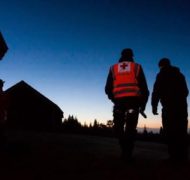God’s Rescue Plan
Daily Reflection / Produced by The High Calling
But seek the welfare of the city where I have sent you into exile, and pray to the Lord on its behalf, for in its welfare you will find your welfare.
Jeremiah 29:7
The Israelites in exile in Babylon were most likely not expecting to hear this word from the Lord. In fact, they were hearing quite different things. Recent prophecies from other notable leaders in the Hebrew community promised something better—deliverance. Israel longed for deliverance. Their Babylonian captors were detestable. Babylonian culture was pagan, perverse.
We remember the context. In 588 B.C., the expanding Babylonian empire conquered Israel and left only a small remnant behind. As was their military policy, the Babylonians claimed Israel’s riches and orchestrated a mass deportation of the majority of Israel’s people back to Babylon, over 1,000 miles away. Israel’s elites were prized captures: government officials, religious leaders, and skilled craftsmen.
We can imagine Israel’s confusion and fear. God’s people did not belong in a place like Babylon. Israel’s identity was historically defined as a people brought out of exile. The story would surely repeat itself in some form or fashion. Would God raise up a new Moses? What plagues would befall Babylon? Perhaps a new Joshua would lead a new army against the wicked empire. One way or another, Babylon would suffer defeat and the honor and place of God’s people would be restored.
In the meantime, Israel would long for the past and resist its present.
But God’s rescue plan was never meant to be limited to a small stretch of land on the eastern shore of the Mediterranean Sea. It includes Babylon too.
Jeremiah’s words reassured Israel that exile did not mean separation from God. God is with us, even here. Indeed, God is at work in our places of exile. For that reason, God calls us to settle in and be about his work with him. Build homes and live in them. Plant gardens and eat from them. Get married and raise families. Take root in the place God has led us to, a posture James Davison Hunter describes as “faithful presence.” A posture that does not separate a longing for our rescue from a desire to serve our Babylonian neighbors. Our work is guided by an inclusive vision of shalom making. Despite the resistance and rebellion we encounter, we don’t discriminate in our prayers or in our Spirit-filled labor.
We hear echoes of the Jeremiah narrative in Jesus’ words in his Sermon on the Mount.
You’re the salt of the earth!...You’re the light of the world! A city can’t be hidden if it’s on top of a hill. People don’t light a lamp and put it under a bucket; they put it on a lampstand. Then it gives light to everybody in the house. That’s how you must shine your light in front of people! Then they will see what wonderful things you do, and they’ll give glory to your father in heaven.
Matthew 5: 13-16; emphasis added.
Love your neighbor. Love your enemy. Love the place where you live. Work in love for its culture. Work in love for its society. God’s rescue plan has them all in mind.
QUESTIONS FOR FURTHER REFLECTION: Is your work motivated by a Joshua narrative or a Jeremiah narrative? When at work and you face disappointment, mistakes, even opposition, is your default to feel threatened and victimized? How can we prepare, finding encouragement and support in the church, that we may together remain committed to an inclusive vision of shalom making?
PRAYER: Father in heaven, we begin our day humbly recognizing that you have called us out of exile ourselves. We are grateful and we belong to you. In this in-between time of “now but not yet,” help us to see what you see, hear what you hear, and desire what you desire for the peoples and places where we live and work. May your Spirit soften our hearts and strengthen our wills that we may sustain the good work you have called us to. May we represent you well, pleasing and honoring you in all we say and do. Amen.
______________________________
Leadership Influence: Beyond the Stereotype
When we think of “leadership” or “influence,” we often get the image of a person of arrogant swagger, always self-confidently willing to tell people what they ought to do. And we naturally find such an image unseemly. This is not the image of Jesus, the most influential person who walked the planet. Neither is it the image of those we truly admire and can name were the most influential people in our own lives. In this series at The High Calling, Leadership Influence: Beyond the Stereotype, we feature stories of how people can be influential in ways that really matter.
Featured image above by Phillip. Used with Permission. Via Flickr.






